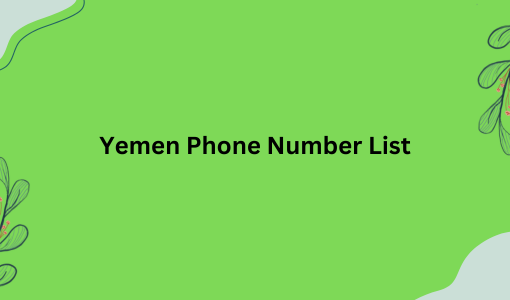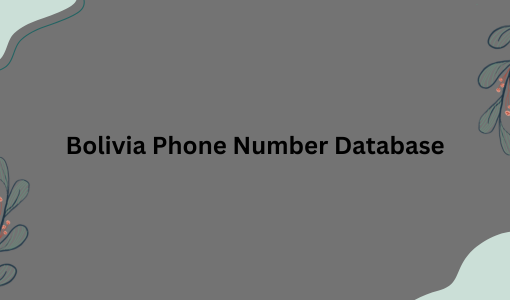Acquiring and using a phone number list in Ireland with 3 million entries requires an extremely high level of attention to privacy laws. Regulations. And ethical considerations. Ireland-as a member of the European Union-enforces the General Data Protection Regulation. Or the most comprehensive data protection law across the globe. Collection. Storage. And use of personal information. Such as a phone number. Are under the auspices of the GDPR and other legislation in force within Ireland. Breaches of these types of laws carry potentially severe consequences legally. Financially. And with regard to one’s reputation.
Legal Considerations
1. General Data Protection Regulation (GDPR)
Because Ireland is a member of the EU. The country uses the General Ireland Phone Number List Data Protection Regulation. A framework which imposes strict limits on how personal data. Such as phone numbers. May be used. The following are some of the most important aspects of the GDPR in regard to procuring lists of phone numbers: Basic Principles of Processing: Under the GDPR. Processing any personal information of individuals without having one of the six lawful bases for that. Is forbidden. Those include:
Consent: He must give clear consent to
Collect his or her phone number and use it for specific purposes.
Legitimate Interest: Sometimes. An organization may process a phone number on the grounds of being able to demonstrate a legitimate interest in doing so. Such as when reaching out to customers. This. However. Requires balancing the legitimate interests with the privacy rights of individuals.
Contractual Necessity: In some cases. Processing may be needed to perform a contract with the individual.
Without a lawful basis. The processing of the phone number may lead to a violation of the GDPR.
Transparency and Accountability
The organization must clearly state for what purpose they process the numbers of individuals while at the same time ensuring that the individuals have clear information that is easily accessible. Put differently. Transparency must be ensured in the use of data so that it can be known by the individuals themselves.
Data Subject Rights: The GDPR provides various rights to individuals. Including the right to access data. The right to correct inaccurate data. And the right to erase data. It is elementary that any personal data inventory list would allow for the Buy Email Database List actual exercise of these rights in fact.
2. Irish Data Protection Law
Apart from the GDPR. Ireland also has a Data Protection Act 2018. Which gives effect to the GDPR within Irish law and provides assurance that additional provisions are adhered to. It is policed by the Data Protection Commission-DPC-which has powers to impose fines and other sanctions in cases of non-compliance.
3. Telemarketing Regulations
Telemarketing in Ireland is regulated under both the PECR and the GDPR. The regulations ensure that when businesses do get in contact-by telephone in particular-for marketing reasons. This is strictly policed. The main requirements in this regard include:
Do Not Call List: The National Directory
Database and/or the Do Not Call Registry is an opt-out approach wherein a person would not wish to receive unsolicited marketing calls. Businesses should check these lists before making a marketing call to avoid calling people who have opted out.
Consent of marketing calls: Companies are supposed to get explicit consent before making marketing calls to their targets. This is through an opt-in procedure. Which allows an individual to voluntarily consent to marketing communications through calls. SMS. Or any other means of communication.
There needs to be an opt-out alternative for each marketing call so that all individuals have the option to opt out or unsubscribe from any further marketing communications. This gives them a choice about the kind of communications they want to receive.
Risks in Using Purchased Phone Number Lists
Breach of Privacy: Buying or making use of such a list without a proper and formal consent record is basically a breach under GDPR and Irish data protection laws. These companies may bear significant fines and legal repercussions because they are using data without a proper lawful basis or actual compliances.
Penalties/Fines: In the event of non-compliance by organizations with the data protection laws under the GDPR. This may include a fine of up to €20 million or 4% of the global annual turnover. Whichever is greater. Apart from the above-mentioned. The DPC is competent to issue penalties for telemarketing non-compliances in their rules.
Reputational Damage: Breach of
Privacy laws often leads to severe reputational damage. Affecting an enterprise’s relations with customers. Investors. And partners alike. After all. Public trust is an important component in the ongoing success of a business.
Irrelevant or Outdated Data: Lists of phone numbers bought from Bulk Database some vendor or service often contain outdated. Incorrect. Or entirely irrelevant data. This can lead to a waste of marketing effort on contacts who are no longer reachable. Which actually harms the reputation of the business in question.
Ethical and Legal Ways of Acquiring Phone Numbers
Permission-Based Marketing: The most ethical and legal way to acquire phone numbers for marketing purposes is through permission-based methods. These include:
Customer Sign-Ups: When customers voluntarily sign up for services. Newsletters. Or product offers. This is a good time to obtain a phone number. It should be of essence that clear consent be sought on this and state the purpose of the data.
Lead Generation: It is generated through Web
Forms or on-site events where people can fill in their contact information for some kind of reward. Like a discount. Free content. Or exclusive offer. Of course. There are the surveys or polls-in return for a premium on their time. People give up their phone numbers in market research studies or customer satisfaction processes.
Verified data providers: A company can purchase phone lists from verified data providers that comply with the GDPR and Irish data protection legislation if it needs a more extensive database. Such providers ensure that the owners of all numbers in the list have given consent to send marketing communications. The provider of data should be selected accordingly.




